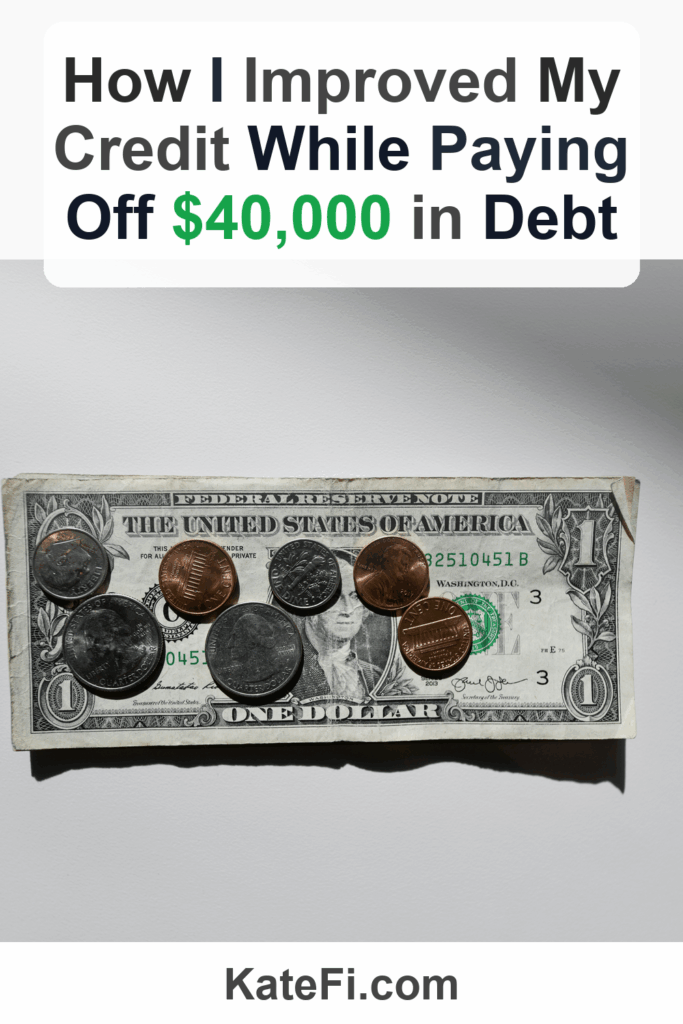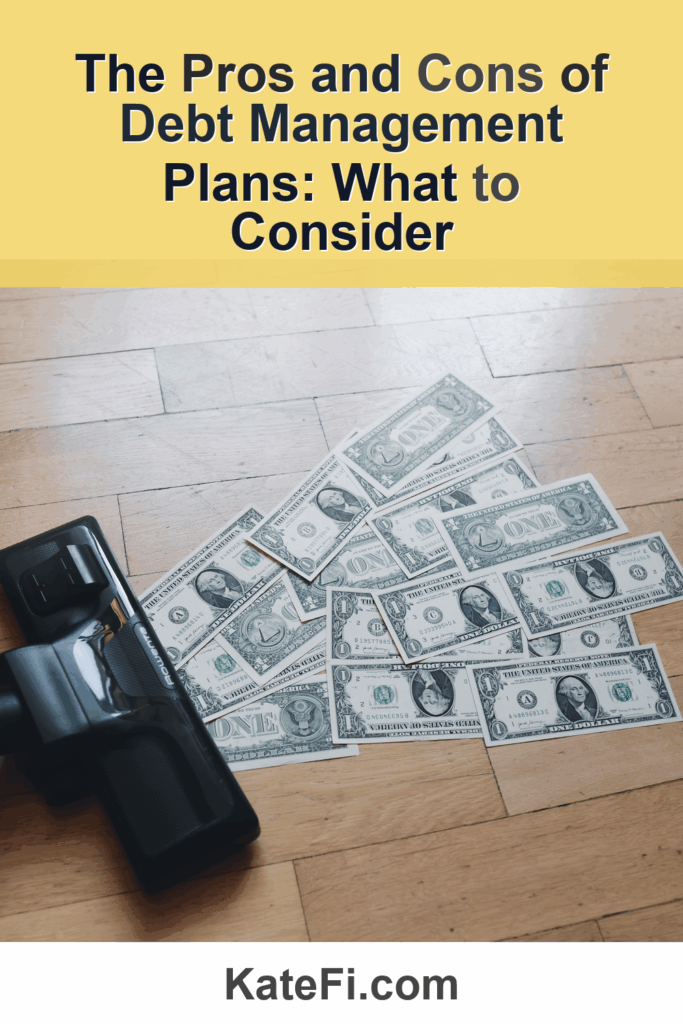Comparing Debt Settlement vs. Credit Counseling: What’s the Difference?
Managing debt can feel like a daunting task, especially when faced with accumulating interest and fees. With various debt relief options available, it’s important to understand the key differences between debt settlement and credit counseling. Both methods can offer pathways to financial freedom, but they operate differently. Let’s dive into the nuances of each approach and help you determine the best fit for your situation.
Love our content? Show your support by following us — pretty please!🥺
FOLLOW ON PINTEREST
Hi! I’m Kate, the face behind KateFi.com—a blog all about making life easier and more affordable.
What is Debt Settlement?
Understand pros/cons of settlement vs consolidation vs DMP for your exact mix of debts.
Not available in IL, KS, OR, TN, UT, WV.
Debt settlement involves negotiating with creditors to reduce the amount of debt you owe. The goal is to reach a lump-sum payment that is less than the full amount due. Typically, this approach is pursued by those who have fallen behind on payments and are struggling to meet their obligations.
What is Credit Counseling?
Credit counseling, on the other hand, provides consumers with education and support to manage their debt more effectively. It often involves working with a certified credit counselor who can assist in creating a personalized debt management plan (DMP). This plan may include negotiating lower interest rates or payment plans with creditors, but it typically doesn’t result in a reduction of the overall debt owed.
How Does Interest and Fees Affect Debt Relief?
What You’ll Learn on the Call
- Estimated timeline and monthly payment range
- How credit may be affected in the short term
- What documents to gather to move faster
Not available in IL, KS, OR, TN, UT, WV.
One of the biggest challenges when it comes to debt is the way interest and fees can snowball. For instance, late fees can add up quickly, leading to a situation where the debt becomes nearly impossible to pay off. Both debt settlement and credit counseling aim to alleviate this burden, but they do so in different ways.
Q: How quickly can I see results with debt settlement?
A: The timeline varies, but you may see results within a few months after negotiation. However, it’s essential to consider the impact on your credit score as you enter into settlement discussions.
Q: What are the typical fees associated with debt settlement?
A: Debt settlement companies often charge a percentage of the debt enrolled in their program, usually ranging from 15% to 25%. Be sure to clarify these fees before proceeding.
Q: Can I get sued while in a debt settlement program?
A: Yes, creditors can still pursue lawsuits during the debt settlement process. This is a risk you should be aware of when negotiating your debts.
Q: How does credit counseling affect my credit score?
A: Credit counseling itself does not impact your credit score; however, if you enter a DMP, some creditors may report your participation to credit bureaus.
Q: What are the fees for credit counseling services?
A: Fees for credit counseling services can vary widely. Many nonprofits offer their services at little or no cost, while for-profit agencies may charge fees based on your debt level.
Debt Settlement vs. Credit Counseling: A Quick Comparison
| Feature | Debt Settlement | Credit Counseling |
|---|---|---|
| Goal | Reduce total debt | Create a repayment plan |
| Negotiation | Yes, with creditors | Yes, but primarily on interest rates |
| Impact on Credit | Can be negative due to missed payments | Neutral if no defaults occur |
| Average Duration | 2-4 years | 3-5 years for DMP |
| Cost | 15-25% of debt enrolled | Varies; often lower fees |
Practical Checklist for Exploring Debt Relief Options
Lower Your Unsecured Debt
If you have $5,000+ in credit card or personal loan debt, a free consult can review options like settlement or hardship plans.
- One-on-one call to review your debts and goals
- See potential monthly payment reductions
- No obligation to enroll
Not available in IL, KS, OR, TN, UT, WV.
When considering debt settlement or credit counseling, it’s important to gather the necessary documents and prepare for discussions with creditors. Here’s a quick checklist to help streamline your consultation process:
- List of Debts: Document all outstanding debts, including creditor names, amounts owed, and interest rates.
- Income Statements: Gather recent pay stubs, tax returns, or any other sources of income.
- Monthly Expenses: Create a list of your monthly expenses to understand your financial situation better.
- Communication Records: Collect any correspondence with creditors regarding your debts, including statements and letters.
- Credit Report: Obtain a copy of your credit report to better understand your credit situation and identify any discrepancies.
Scripts for Communicating with Creditors
To further assist you, here are some script templates for initiating discussions with creditors:
For Debt Settlement:
- “Hello, my name is [Your Name], and I’m currently facing financial hardship. I’d like to discuss my outstanding balance of [Debt Amount] and see if there’s an opportunity to settle for a reduced amount. I believe that with your assistance, I can resolve this matter.”
For Credit Counseling:
- “Hi, this is [Your Name]. I’m seeking guidance on managing my debts and would like to explore options for a repayment plan that would be more manageable for me. Can you help me set up a consultation with a credit counselor?”
✅ See If You Qualify for Debt Relief
Common Questions About Debt Settlement and Credit Counseling
Q: Will my creditors stop calling me if I enter a debt settlement program?
A: While creditors may continue to contact you during settlement negotiations, under the Fair Debt Collection Practices Act, they must cease communications if you formally dispute a debt.
Q: What happens if I don’t complete the program?
A: If you withdraw from a debt settlement program, creditors may resume collection efforts, and any settlements achieved may be lost.
Q: Are there alternatives to debt settlement and credit counseling?
A: Yes, alternatives include debt consolidation, bankruptcy, and simply creating a budget to pay off debts without formal assistance.
Q: How do I choose between debt settlement and credit counseling?
A: Assess your financial situation, level of debt, and willingness to negotiate. A free consultation can help clarify your best option.
Impact on Your Credit: Understanding the Trade-Off
Both debt settlement and credit counseling can impact your credit score, but in different ways. While credit counseling is less likely to harm your credit, debt settlement often results in a drop in your credit score due to missed payments. As you explore options, it’s crucial to consider the long-term implications on your credit health.
✅ See If You Qualify for Debt Relief
Conclusion: Finding Your Path to Debt Relief
Deciding between debt settlement and credit counseling is a significant choice, and understanding the nuances of each can help you find the right path to financial stability. Both options aim to alleviate the pressure of overwhelming debt, but they do so with different strategies and outcomes.
If you’re feeling overwhelmed by your financial situation, consider getting a free consultation to review your options. It can be a great first step toward regaining control over your finances.
Remember, every situation is unique, and exploring all available avenues will empower you to make informed decisions that align with your financial goals.
Important: This content is for education only—not legal, tax, or financial advice. Results and eligible programs vary by situation and state. Fees apply if you enroll and complete a program. Debt relief can affect credit; missed payments may lead to collections/lawsuits. Not available in IL, KS, OR, TN, UT, WV.






















